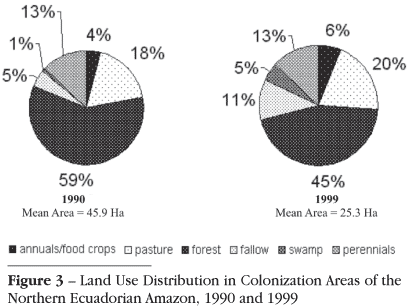This paper draws upon a detailed longitudinal survey of households living on agricultural plots in the northern three provinces of the Ecuadorian Amazon, the principal region of colonization by migrants in Ecuador since the 1970s. Following the discovery of petroleum in 1967 near what has subsequently come to be the provincial capital and largest Amazonian city of Lago Agrio, oil companies built roads to lay pipelines to extract and pump oil across the Andes for export. As a result, for the past 30 years over half of both Ecuador's export earnings and government revenues have come from petroleum extracted from this region. But the roads also facilitated massive spontaneous in-migration of families from origin areas in the Ecuadorian Sierra, characterized by minifundia and rural poverty. This paper is about those migrants and their effects on the Amazonian landscape. We discuss the data collection methodology and summarize key results on settler characteristics and changes in population, land use, land ownership, technology, labor allocation, and living conditions, as well as the relationships between changes in population and changes in land use over time. The population in the study region has been growing rapidly due to both natural population growth (high fertility) and in-migration. This has led to a dramatic process of subdivision and fragmentation of plots in the 1990's, which contrasts with the consolidation of plots that has occurred in most of the mature frontier areas of the Brazilian Amazon. This fragmentation has led to important changes in land tenure and land use, deforestation, cattle raising, labor allocation, and settler welfare.
Ecuadorian Amazon; agricultural colonization; population change; land use change; migration












